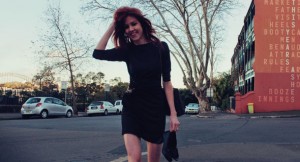This Year’s Ashes | Griffin Theatre Company
- October 13th, 2011
- Posted in Reviews & Responses
- Write comment

There are some theatre experiences which push you out into the world, trembling but ready to face it. This Year’s Ashes is one of those experiences.
“Ellen lives a shiny life in the heart of a shiny city. She hates her office job, the alcohol isn’t making her as drunk as it used to, and she seems to be allergic to the water. But there is always the company of strangers in this city – the stranger, the better. She thinks she’s doing fine, except that lingering grief has taken hold and the anonymous guy she’s going home with may not be so anonymous.”
There’s more to this play than meets the eye.
It is easy to dismiss a naturalistic play – especially one who has a woman as a protagonist – as more of a film than a piece of theatre. But theatre is, should be a reflection of us – in our ugly, blurry, confused, grieving, disconnected mess…
Ellen is stuck. She is messy. Alone. Sometimes malicious, sometimes focused on self-preservation. This portrait so clearly defined by Belinda Bromilow shows a kamikaze search for a modern woman to fill up her life with something. There is sexual power, sexual freedom – which somehow manifests in a detachment or a lack of fulfillment – a bored emptiness, a harshness. Sex is reduced to a disappointed amnesic blur – the result of too much wine and the paper-thin toleration of bumbling, fumbling men.
Jane Bodie – knows what she’s doing. This play is not to be taken lightly – and on a basic level can be understood as a romantic comedy with a dark core – but there is something more at work here. There is an examination of loss – of self, of family – a feeling of being overwhelmed and surrounded by an unachievable shiny reality that demands and presses on us, until we are closed down, until our imagination is closed down, until our ability to connect or remember of love, is closed down. And structurally there are plenty of surprises – none of which I want to ruin for you. You must see this play.
This year’s Ashes seeks to address many modern dilemmas. How do we find meaningful connection in a superficial place driven by rules, driven by individualism, and to some extent driven by intellectual panic. How do we, at the pace in which we live and in the way in which we live – how do we grieve – how do we find time and space to grieve? Equally, how do we find and accept meaningful connection – why are there so much loneliness in a city full of people? Is it possible to find meaning amongst all the self-knowing machinery of advertising and seeming shallowness of human exchanges? Are there rules which we must abide by? And how do those rules impact how we love, how we mourn, how we effect each other? Are these rules pre-ordained – or static? Can they go unbroken – and what if we do break them? What then?
I was swept up and away by the poetry of Bodie’s language – also I fell in love with her men – I fell in love with the nasty/selfish/broken/complex Ellen and her carousel of magnificently deficient lovers – and who can deny the easy charm of Adam (Nathan Lovejoy)? We laugh with her. We find her witty, and difficult and disgusting – and utterly real. I sat at the end of the play – not really wanting the applause to happen – just wanting to sit in the final moment – the realisation that change is possible. I wanted to be silent and still and slip into the night.
There is an interesting structural device used in the play- in that the moment for me when we are most satisfied is when we are watching the best New Year’s Eve ever take place. In that moment, we see Ellen find, accept or realise that she has what she wants – a friend. But there are two more scenes to go – which could be seen as an “over written” ending – where we receive two more endings. But I think not. I think Bodie is smarter than that – what we have is a continuation – one that says, life continues beyond someone getting what they want (and in this case when they receive what they need). And we end with the beginning – a very hopeful, very playful past – a past that doesn’t yet know it’s future as both transform.
And we are left, in our seats, hopeful, reassured, ready – open to accept the possibility of the transformative power of love.
This show is going to sell out, do yourself a favour and make this the show you take your favourite girlfriend to – encourage her to wear her favourite shoes, buy her a glass of her favourite sav blanc and toast to the possibilities of all which is to come.
No comments yet.